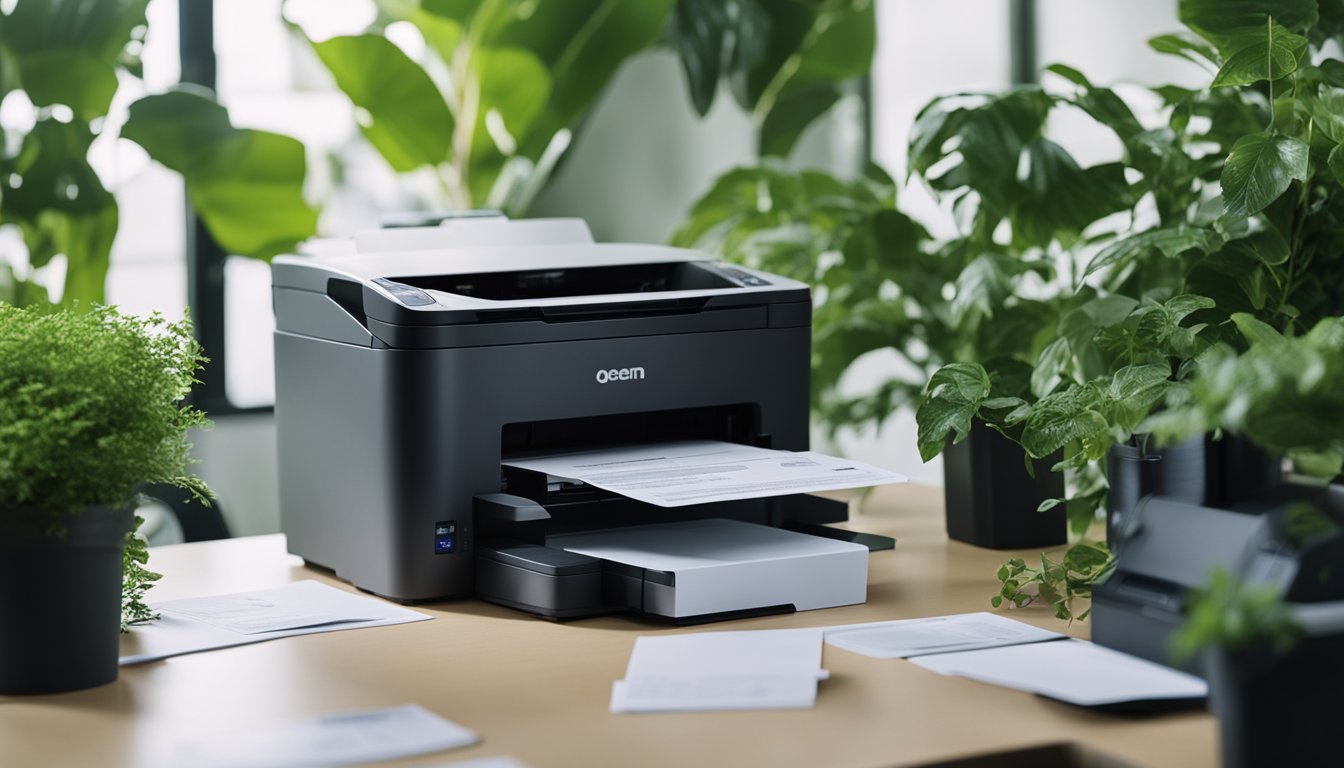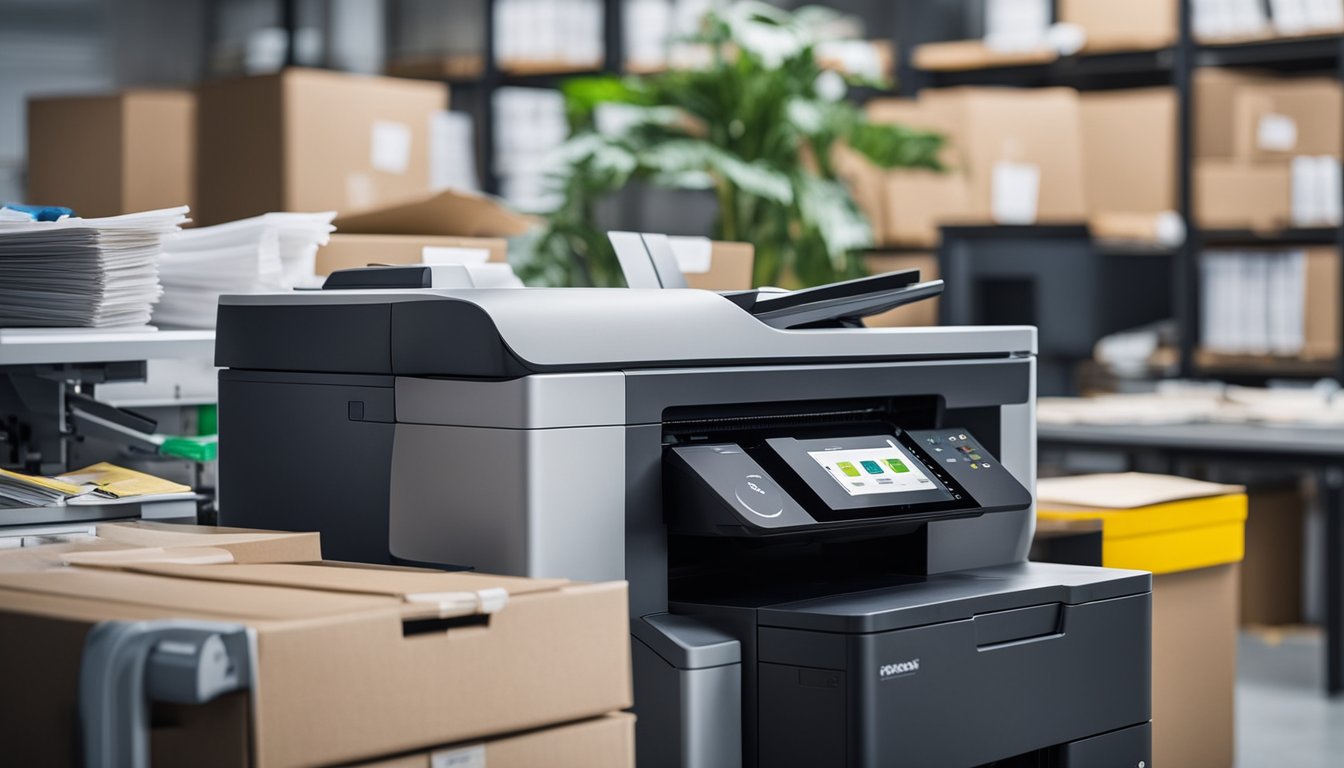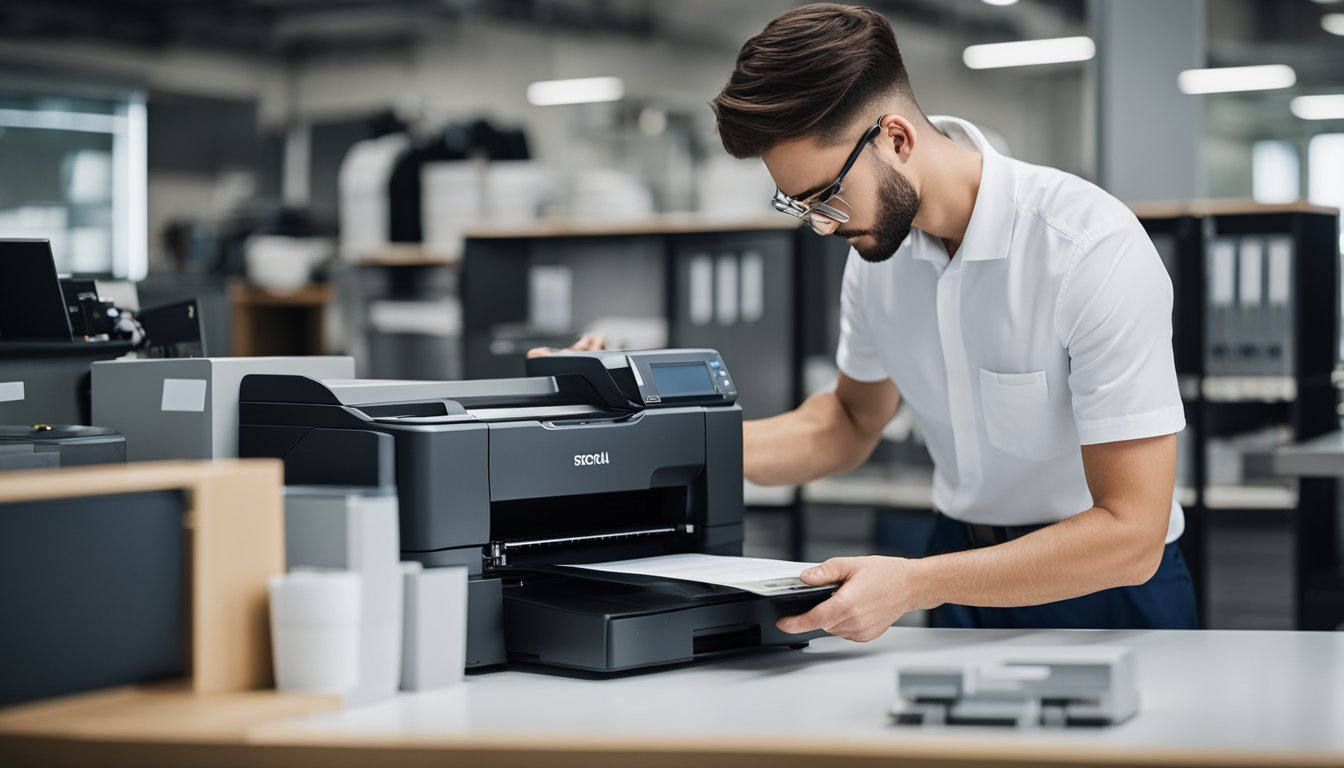Late updated: 30 Mar 2025 14:03
Written by: Amber Collins
Eco-Friendly Printing Solutions For UK Offices: Enhancing Sustainability and Efficiency
In an age where sustainability isn't just a buzzword but a necessity, many offices are actively rethinking their printing practices. The UK has seen a shift towards more eco-friendly printing solutions that not only align with environmental goals but also bring cost-efficiency and improved performance. Modern sustainable printing solutions allow us to meet operational needs while minimising our impact on the planet.

As we explore these advancements, it's crucial to assess our current practices. This involves looking at everything from the type of equipment we use to the consumables we order. With the availability of refurbished printers and recycled materials, there are multiple ways to enhance our office's green credentials. Adopting these eco-friendly practices doesn't just improve our environmental stewardship; it also optimises our operational processes and extends the life of our resources.
Navigating the landscape of eco-friendly printing can be daunting, but with the right approach, it's a rewarding venture. From carbon-neutral devices to innovative managed services, sustainable options are more accessible than we might think. Our commitment to environmentally friendly printing solutions involves informed choices, strategic planning, and a dedication to continuous improvement.
Key Takeaways
- Implement sustainable practices in office printing for better environmental impact.
- Optimise print operations with refurbished equipment and eco-friendly materials.
- Eco-friendly solutions enhance both sustainability and operational efficiency.
Assessing Office Printing Practices for Sustainability

In our pursuit of sustainable office practices, assessing and optimising our printing methods stands as a critical step. By focusing on understanding our printing needs, choosing energy-efficient equipment, and incorporating recycled materials, we can substantially reduce our environmental impact.
Quantifying Office Printing Needs
First, we need to examine our printing volume and identify areas for improvement. Conducting a usage audit helps us determine which documents truly require printing and which can remain digital. This not only cuts down paper use but also highlights under-utilised devices, allowing us to streamline our equipment to match actual needs.
A thorough analysis includes:
- Identifying peak usage times
- Tracking energy consumption
This ensures we scale back on redundant machines, ultimately lowering our energy footprint.
Choosing Sustainable Printing Equipment
In selecting sustainable equipment, we prioritise devices with low energy consumption, such as energy-efficient laser or inkjet printers. Brands offering models with automatic duplex and eco-mode features can significantly enhance our sustainability. RISO printers, for example, offer cold printing processes that are energy-efficient and suitable for high-volume tasks, balancing productivity with eco-friendliness.
Important considerations when choosing equipment include:
- Compatibility with recycled paper
- Energy Star certifications
- Low-volume standby modes
Investing in technology that supports these features helps us maintain an eco-consistent office.
Implementing Recycled Materials
Incorporating 100% recycled paper and eco-friendly inks is critical in reducing resource consumption. By ensuring our supplies are FSC-certified, we not only support sustainable forestry practices but also reduce the overall environmental footprint of our office operations.
Practical steps for implementing recycled materials include:
- Partnering with suppliers of sustainable materials
- Using soy or vegetable-based inks
Additionally, promoting a culture of conservation within the office enhances our commitment to sustainability, encouraging everyone to adopt smarter printing habits. These strategies collectively contribute to a greener workplace.
Optimising Print Operations and Maintenance

In today's corporate landscape, optimising print operations is critical for reducing environmental impact and enhancing operational efficiency. By focusing on advanced finishing options, waste reduction, and environmental certifications, we can align our printing needs with sustainable goals.
Advanced Finishing Options
Incorporating advanced finishing options in office print operations can significantly streamline processes. These options, such as duplex printing and automated binding, not only improve efficiency but also contribute to reduced maintenance costs. Offering features like stapling, punching, and collating directly from the printer can cut down on time spent managing documents manually.
Advanced features reduce wear and tear on individual components, effectively decreasing the need for frequent maintenance. Opting for modular finishing systems allows us to tailor equipment to meet specific needs, providing flexibility and further reducing operational costs. Investing in such technology is an eco-friendly move, aligning operations with our commitment to sustainability.
Enhancing Efficiency and Reducing Waste
Optimising printing processes involves more than just selecting the right hardware. By installing energy-efficient printers and implementing print management software, we can greatly enhance efficiency. Such systems monitor and control print activities, ensuring only necessary documents are printed, thus minimising paper waste and reducing CO2 emissions.
Transitioning to digital documentation and cloud-based solutions further complements waste reduction by decreasing reliance on physical storage. This transition also supports remote working, encouraging a paperless culture. We must ensure our goals remain aligned with long-term environmental targets, focusing on sustainable growth and reduced operational costs.
Environmental Programmes and Certifications
Aligning with credible environmental programmes reinforces our commitment to responsible printing. Certifications like ISO 14001 and adherence to programmes such as Carbon Trust demonstrate dedication to reducing carbon footprints. By partnering with suppliers who share these values, we can ensure a consistent supply of environmentally-friendly materials.
Adopting carbon offset initiatives—like supporting reforestation projects—can help make our operations carbon-neutral. These efforts not only enhance our environmental credentials but also promote a positive brand image, showcasing our dedication to greener choices. Engaging employees in these initiatives fosters a corporate culture of sustainability, encouraging ongoing commitment.
Frequently Asked Questions
In the world of eco-friendly printing, critical insights into UK-specific solutions can facilitate informed decisions. This section provides precise information on available options, cost considerations, and implementation strategies.
What are the top eco-friendly printing services available for an office in the UK?
UK offices can choose from a variety of services, including those that use recycled paper, printing with vegetable-based inks, and energy-efficient printers. Companies like Lanes Printers and Evolve Document Solutions focus on reducing environmental impact without sacrificing quality.
How does the cost of eco-friendly printing solutions for UK offices compare to traditional printing?
The initial cost for adopting eco-friendly printing solutions might be slightly higher than traditional methods. However, the investment often leads to savings over time through reduced energy consumption and material costs. Additionally, eco-friendly options may help offices align with sustainability goals, potentially saving on regulatory costs.
What are the most sustainable options for printing on fabric within a professional setting?
When considering fabric printing, water-based inks and printing processes that minimise water usage are ideal. Opting for organic or recycled fabrics further enhances sustainability. Imago Group highlights the environmental benefits of carefully selecting materials that reduce the ecological footprint.
How can UK offices implement environmental printing practices effectively?
Offices can integrate environmental practices by conducting regular audits of printing needs and establishing guidelines to reduce waste. Encouraging double-sided printing, using energy-efficient devices, and implementing recycling programmes are effective measures. Training employees on sustainable practices also plays a crucial role.
What are the leading eco-friendly book printing options in the UK?
Leading printers offer eco-friendly book solutions using recycled paper and non-toxic inks. Additionally, partners focusing on ethical sourcing and waste reduction can further minimise impact. Establishing relationships with such printers ensures that book publishing projects meet environmental standards.
What techniques are used for eco-friendly art printing to ensure minimal environmental impact?
Art printing can adopt sustainable methods by using digital printing technologies, which generate less waste compared to traditional techniques. Employing materials like FSC-certified paper and non-toxic inks are standard practices. These techniques ensure the creation of environmentally responsible art without compromising on quality and artistry.
